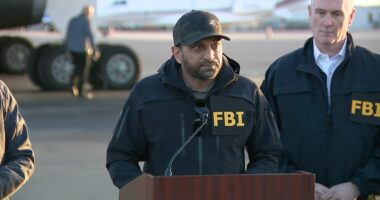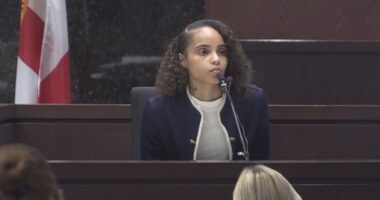Share this @internewscast.com

PHOENIX (AP) — The governor of Arizona and the Republican-controlled Legislature are at an impasse over how to regulate groundwater pumping in the rural parts of the state, with time running out.
Democratic Governor Katie Hobbs initially collaborated with local Republican leaders as this year’s legislative session began, hopeful that her initiative to establish rural groundwater management areas would gain Republican support. However, nearly four months later, negotiations have stalled and tensions have risen as both parties struggle to reach a consensus on conserving increasingly scarce water resources amidst ongoing drought conditions.
Governor Hobbs’ office reports that negotiations have been at a standstill since early April. Meanwhile, during the same period, a distinct proposal from the Arizona Department of Water Resources to significantly reduce overdraft levels in the Willcox Basin has led to discontent among Republicans and various interest groups, with Republican negotiator Sen. Tim Dunn describing the reduction goal as “unattainable.”
Overdraft refers to when groundwater extraction exceeds what is being replenished.
Hobbs has said that if lawmakers adjourn — typically in the summer — with no deal, she will take matters into her own hands.
Disagreements as water supplies dwindle
Water basins in rural Arizona are largely unregulated, and Democrats and Republicans have different visions on how to slow depletion.
Negotiators, including staff from the governor’s office and bipartisan lawmakers, have clashed over proposed mandates for reducing groundwater pumping from aquifers. Republicans who introduced their own plan say the one from Democrats is too high. Democrats say the GOP proposal isn’t high enough.
Both sides also disagree on the makeup of local councils that would govern groundwater usage, the water basins that would be included and the pathway for future regulation.
Meanwhile, underground water supplies continue to shrink to the point that some wells in rural areas have gone dry. Residents are faced with the choice of drilling deeper, hauling water or moving, said Sarah Porter, director of the Arizona State University Kyl Center for Water Policy. Managing the groundwater won’t reverse the decline but can slow it, she said.
Arizona’s regulatory framework for managing groundwater was first enacted in 1980 and largely centers on the state’s most populous areas, including Phoenix and Tucson. Porter said the active management areas were designed to apply to growing cities and are too burdensome to replicate in rural areas where agriculture is at the heart of local economies.
The Arizona Department of Water Resources has proposed a separate reduction in overdraft in the Willcox Basin, which caused uneasiness among Republicans and others who say that could jeopardize businesses in rural Arizona.
For years, legislators on both sides of the aisle have failed to get proposals to manage groundwater in rural Arizona to the governor’s desk or signed into law.
In 2022, voters approved a ballot measure to establish an active management area in Douglas, a rural city on Arizona’s southeastern edge. In recent months, Hobbs used executive authority to create another in the Willcox Basin, another rural community north of Douglas.
‘Negotiations are going nowhere’
Bipartisan negotiators have not met in several weeks on a framework that would significantly broaden the scope of the Groundwater Management Act, according to multiple people.
“I think it’s pretty clear that the rural groundwater negotiations are going nowhere,” said Democratic state Sen. Priya Sundareshan, one of the legislative negotiators.
In a Tuesday statement, Hobbs accused GOP legislators of refusing to come to the negotiating table.
Dunn said since the last negotiating meeting he’s been meeting regularly with people on what language they might find agreeable despite sour moods over the water resources proposal for the Willcox Basin and the little time lawmakers have left to make a deal. He said he would like to call another meeting with Hobbs’ office and Democratic legislators soon but said the water resource’s proposal doesn’t bode well for talks in the Legislature.
“If that’s their end game, we can’t get there,” Dunn said.
Philip Bashaw, CEO of the Arizona Farm Bureau, which has been involved in crafting the GOP rural groundwater bills the past two years, said the water resources’ proposal further frustrated negotiations on the bills and fueled anxiety.
“It definitely took a lot of the air out of the balloon, that’s for sure,” Bashaw said.
















